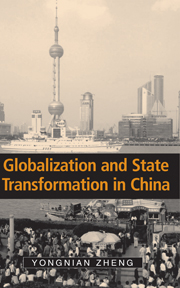Book contents
- Frontmatter
- Contents
- List of figures
- List of tables
- List of abbreviations
- Preface
- 1 Globalization: State decline or state rebuilding?
- 2 The state, leadership and globalization
- 3 Globalism, nationalism and selective importation
- 4 Power, interests, and the justification of capitalism: Constructing an interest-based political order
- 5 Bureaucratic reform and market accommodation
- 6 Building a modern economic state: Taxation, finance and enterprise system
- 7 State rebuilding, popular protest and collective action
- 8 Contending visions of the Chinese state: New Liberalism vs. the New Left
- 9 Globalization and towards a rule-based state governance?
- Notes
- Bibliography
- Index
- CAMBRIDGE ASIA-PACIFIC STUDIES
4 - Power, interests, and the justification of capitalism: Constructing an interest-based political order
Published online by Cambridge University Press: 11 December 2009
- Frontmatter
- Contents
- List of figures
- List of tables
- List of abbreviations
- Preface
- 1 Globalization: State decline or state rebuilding?
- 2 The state, leadership and globalization
- 3 Globalism, nationalism and selective importation
- 4 Power, interests, and the justification of capitalism: Constructing an interest-based political order
- 5 Bureaucratic reform and market accommodation
- 6 Building a modern economic state: Taxation, finance and enterprise system
- 7 State rebuilding, popular protest and collective action
- 8 Contending visions of the Chinese state: New Liberalism vs. the New Left
- 9 Globalization and towards a rule-based state governance?
- Notes
- Bibliography
- Index
- CAMBRIDGE ASIA-PACIFIC STUDIES
Summary
In the Manifesto of the Communist Party, Marx and Engels argued:
The bourgeoisie has through its exploitation of the world-market given a cosmopolitan character to production and consumption in every country…. All old-established national industries have been destroyed or are daily being destroyed…. In place of the old wants, satisfied by the productions of the country, we find new wants, requiring for their satisfaction the products of distant lands and climes. In place of the old local and national seclusion and self-sufficiency, we have intercourse in every direction, universal interdependence of nations. And as in material, so also in intellectual product. The intellectual creations of individual nations become common property. National one-sidedness and narrow-mindedness become more and more impossible, and from the numerous national and local literatures, there arises a world literature.
Marx and Engels are cited here not only because this was among the earliest and best statements about globalization; more importantly, it is because this statement has been frequently quoted by Chinese government-scholars to justify globalization in China and the integration of the country into the capitalistic world system. According to Gu Yuanyang, the Director of World Economy and Politics at the Chinese Academy of Social Sciences, while globalization since Marx has been associated with capitalism and the bourgeoisie, it cannot be viewed as solely belonging to the bourgeoisie as socialists are also globalists.
- Type
- Chapter
- Information
- Globalization and State Transformation in China , pp. 60 - 82Publisher: Cambridge University PressPrint publication year: 2003

